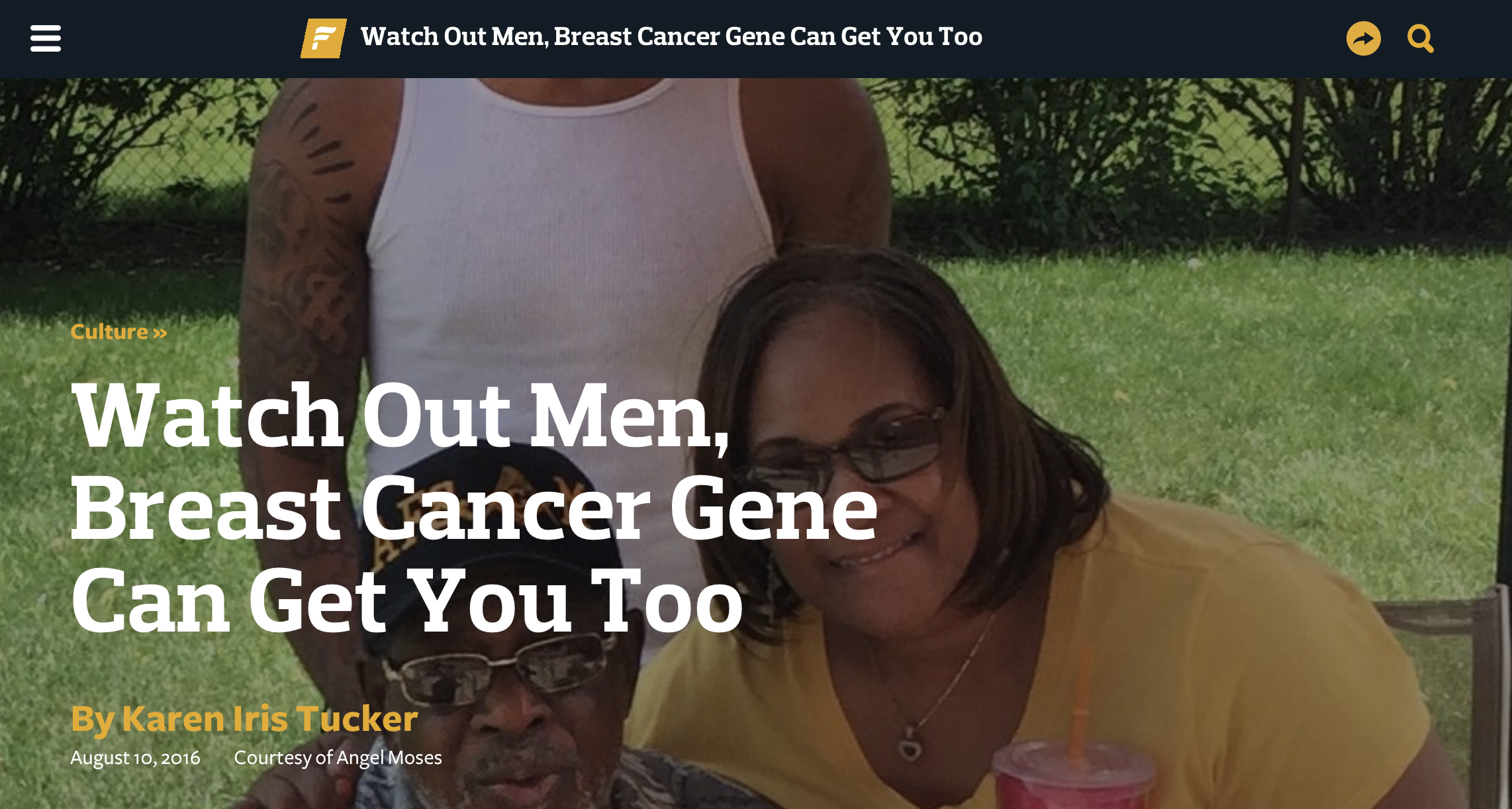PUBLISHED: 17th June 2018

by Sue Friedman
Half of all people with an inherited BRCA, ATM, CHEK2, PALB2 or other mutation associated with HBOC are men. Nevertheless, the majority of awareness, research, and resources have focused on genetic testing in women. A recent article in JAMA highlights this disparity in BRCA testing between men and women. Emerging information on the impact of mutations in men reinforces the importance of FORCE’s research, education, support and advocacy efforts to reach the male population.
According to the article by Childers, et. al., men without cancer have BRCA genetic testing at one-tenth the rate of women. However, no such disparity in testing between men and women was seen for Lynch syndrome, which increases the risk for colorectal, uterine, and ovarian cancer, among others.
HBOC, cancer risk and genetic testing in men
As in women, having a BRCA mutations can increase a man's risk for pancreatic cancer and melanoma. BRCA mutations can also increase the risk for male breast cancer, although not as greatly as for women. The mutations can be associated with an increased risk for aggressive prostate cancer. Importantly, as with women, men can pass on their inherited mutation to their sons and daughters.
Despite these known risks, very little research and resources have focused on genetic testing of men. This has led to common misperceptions about men and mutations associated with HBOC. Given the use of the words “breast and ovarian cancer” in the HBOC name, it is not surprising. There is a mistaken and dangerous belief among some health care providers and many consumers that men cannot carry, or pass on a BRCA, or other mutation in a gene associated with HBOC. Equally dangerous is the mistaken belief that men who inherit mutations do not have increased cancer risk.
Some of this misinformation may be the result of older breast cancer risk assessment models that focused only on the family history of female relatives. Additionally, the frequent association with breast cancer can overshadow the other cancer risks. Some genetic testing guidelines exclude men, making insurance reimbursement more difficult. Finally, there is more media attention on women than men with mutations. Outspoken female celebrities, such as Angelina Jolie and Christina Applegate have raised the profile of genetic testing in women and perpetuated the public perception that these gene mutations don’t affect men.
Male breast cancer
Men who carry a BRCA mutation have a higher risk for breast cancer than men in the general population. For this reason, national guidelines recommend that men with mutations undergo breast self-exam training and education and an annual clinical breast exam beginning at age 35.
All men with breast cancer meet national guidelines for genetic testing. As with women, genetic testing for men with breast cancer can help guide treatment decisions. The PARP inhibitor, Lynparza, was recently approved for advanced breast cancer in people with a BRCA mutation, including men.
Some clinical trials are using PARP inhibitors and other new therapies to treat patients with hereditary breast cancer.
In a recent FORCE survey for people diagnosed with breast cancer, 18 of the 1900 respondents were men. Among these men, only 1/2 were told about the link between male breast cancer and an inherited mutation. About 1/4 said their health care provider never recommended genetic testing.

New research on genetic testing and prostate cancer
Most prostate cancers are very slow-growing and often do not pose significant risk for men. For this reason, national preventive guidelines recommend that men ages 55-69 speak with their health care provider to decide whether or not to undergo screening. These same guidelines recommend against prostate cancer screening after age 70.
Although most prostate cancers can be slow growing, some prostate cancers can be more aggressive and potentially life-threatening. Recent research shows a link between these aggressive prostate cancers and inherited mutations in BRCA1, BRCA2, ATM and CHEK2. For this reason, national guidelines recommend men with metastatic prostate cancer have genetic counseling and testing. They also recommend that men who test positive for a mutation discuss with their doctor about starting prostate cancer screening at age 45.
Men with a BRCA or other mutation who develop prostate cancer may be offered more extensive treatment sooner than patients who do not have a known mutation. Prostate cancer patients with a known mutation may qualify for participation in clinical trials of targeted therapies. Many ongoing studies are specifically designed for mutation carriers with prostate cancer, including those that are looking at the use of PARP inhibitors, which are approved for use in breast and ovarian cancer.
This research didn't come in time for my dad. By the time he was diagnosed with prostate cancer, my own father—from whom I inherited my BRCA2 mutation—already had advanced disease which ultimate took his life. That was a decade ago. Yet even now, a decade later, awareness about the hereditary link to aggressive prostate cancer remains low. FORCE volunteer, Angel Moses experienced this first-hand when her father’s oncologist dismissed this link and told them that the BRCA2 mutation in their family doesn’t affect men.
It’s important that we continue our efforts to correct misinformation and assure that all people—men and women— who are affected by hereditary cancer have access to the genetic counseling, testing, preventive and treatment services, support and information that they need to live healthy and empowered lives.
POSTED IN: Men With Mutations , Genetic Testing
TAGS: BRCA , Hereditary Cancer , Breast Cancer , Cancer Prevention , Genetic Counseling , Genetic Testing , BRCA1 , BRCA2 , Previvor , HBOC , Prostate Cancer , USPSTF , Screening And Prevention , PALB2 , PTEN , Pancreatic Cancer , Male Breast Cancer , CHEK2 , ATM
7 Comments
June 17, 2018
Sue, We need to lobby for BRCA men to be enrolled in public breast cancer screening programs. And we need to lobby for men to be included in breast cancer trials. I'm a BRCA1 VUS with both breast and prostate cancers and I'm having to make this narrative up as I go along due to institutional blindness to this situation.
Rod Ritchie
Reply
June 18, 2018
Hi Rod, I agree. We need more incorporation of genetic risk assessment for both men and women to help guide screening practices based on risk. We also need more incorporation of tumor testing for targeted therapies to help guide treatment!
Sue Friedman
Reply
June 20, 2018
Thank you Sue! I have been advocating for years ,that men been are being left out of testing and proper treatment.
Frank Poynter
Reply
June 27, 2019
[…] is a large gap in awareness about inherited gene mutations and how they may affect men. It’s important for men to know about genetic testing, because they are at increased risk for breast, prostate, pancreatic and other cancers if they test […]
Men Can Have Breast Reconstruction After Mastectomy - Facing Our Risk of Cancer Empowered - Facing Our Risk of Cancer Empowered
Reply
June 3, 2019
I was tested and therefore had my daughter tested. she had the gene and I felt guilty for passing this to her. (silly I know) she increased her exams and testing and when she did find a lump in her breast and had surgery and is now fine she told me to stop feeling guilty because by me getting tested and having her tested it might have just saved her life. So my suggestion to men is get tested. If not for you do it for your children and their children.
Howard Siegel
Reply
June 18, 2018
My husband was diagnosed with prostate cancer in 2003. 16 months after having surgery to remove his prostate a PSA test showed his numbers were high. radiation soon after but again the cancer was still present so he started hormone therapy that kept him in check until 2010 when he was diagnosed with breast cancer. Luckily his surgeon asked questions and felt since his sister had ovarian cancer that they possibly carried the BRCA gene which they did. I wish the 1st doctor, and all the others after him had started asking about any other family cancers. If they had they probably would have had him tested which would have changed the course of his future medical care. With knowledge and early detection he may not have died at 64 years old.
Linda Lewis
Reply
June 18, 2018
Hi Linda, I'm so sorry to hear about your husband. My father, too learned about the connection to risk for men too late. I worry about my son as well. Reaching men is a high priority area for us at FORCE; for many of our staff, board, volunteers and members it's highly personal. Warm regards, Sue
Sue Friedman
Reply